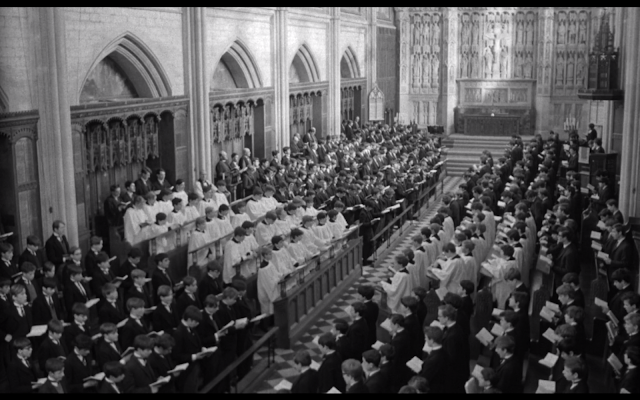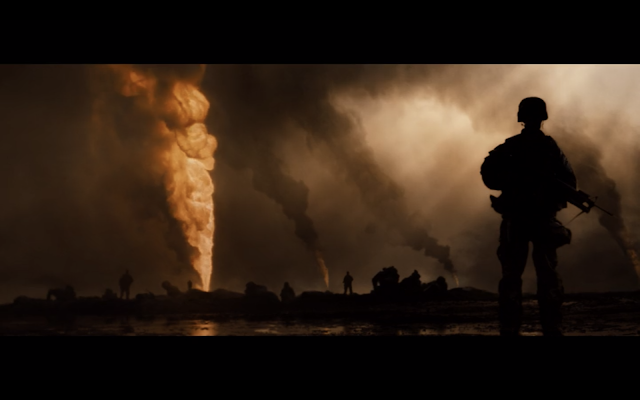If.... (1968)
Lindsay Anderson's 1968 counter-culture movie, If...., is best described as messy and angry. Anderson's critique of British culture is incredibly clear. The movie's plot runs as follows: Teenage rebel Mick Travis (Malcolm McDowell) returns to his upper-crust English public school, caught between the sadistic older boys known as the Whips and the first-year students, known as Scum, who are forced to do their bidding. The petty thefts and anti-social behavior of Travis and his two henchmen, Johnny (David Wood) and Wallace (Richard Warwick), soon attract the attention of both the Whips and the school's out-of-touch administration and lead to an unexpected showdown.
There's a lot to like and dislike about If...., so I'll start with what I thought was executed perfectly. McDowell's debut performance as Mick Travis is perfect, from the minute we meet Mick we see the mischieve behind his eyes. Dressed in all black, a whip calls him Guy Fawkes. McDowell helped make Mick feel relatable to the viewer despite Mick being a protagonist that most might find hard to get behind. Anderson begins with the character Jute, a Scum, who we are at first led to believe is the main protagonist. Instead, Anderson subverts this expectation and introduces us to Mick. Throughout the movie, we sometimes cut to Jute's perspective. This is Anderson's way of saying that Jute will one day become like Mick.
If.... also captures the atmosphere within a boarding house perfectly. The boarding house depicted is brutal and has a strong homoerotic air. Speaking from experience, this isn't that far to how current boarding houses are, despite the one depicted in the film being in the '60s, British and satirized. The boarding house is brutal where the Whips are unjustifiably cruel to those they have power over. The scene where three men are thrashed is incredibly tense as we wait for Mick's turn in the room. The viewer doesn't see what happens until Mick enters. The scene is long, making the viewer stay in the agony that Mick endures. Yet the question is whether this justifies the movie's horrific ending.
Anderson draws an interesting allusion between conservative Britain to its similarity to fascist countries. Anderson does this very indirectly, using a history teacher to draw this comparison. The teacher states that it wasn't one man who created Nazi Germany but an entire nation of people. In If.... we are shown mass congregations of young boys in uniform as they are forced to listen to men in uniform. Interestingly enough, the stand which upon these men speak is an eagle. The young men are also forced to attend military war training.
Yet If.... falls flat for several reasons. Anderson intercuts his movie with extremely surreal scenes. The naked wife of the housemaster walking through the hallway, a priest in the headmaster's drawer, during the final shootout the bodies disappear after we cut out and in again and the entire chapter of romance, the unnamed girl (who I believe is the manifestation of Mick's yearning for revolution and doesn't really exist) who appears several times, are all incredibly bizarre. The scenes don't add anything to the movie except for the confusion. This played with random use of black and white creates an experience that muddles what Anderson is attempting to say. There also scenes that are pointless, like several cuts that demonstrate how one teacher lives. We expect some sort of pay off, for Chekhov's gun to fire, yet it never does and the viewer is left wondering what's the point?
I also have issues with the movie's end. It sits uncomfortably and doesn't fit with the movie's tone or pacing. It ends with Mick and his posse sitting atop a building firing down on students. teachers, a priest, a military general and a member of the royal family who came for a speech. The scene follows to close to what's been happening in the last few years and it's too unclear whether Anderson is justifying this disgusting action. The viewer is left with unease, unclear how they are supposed to feel. Anderson also creates a relationship between an underage Scum and Wallace an upper-classman. This relationship, no matter how sweet it's shown, feels wrong.
Overall, I came out of the movie feeling almost underwhelmed. The premise was amazing and with the right execution could have been a brilliant commentary on the strife British youth faced with the need to conform and classist society, instead, the movie felt aimless and misguided in what it attempted to mock. Offering no solutions to Britain's problems besides mindless violence, If.... is an okay movie with a stellar performance from McDowell.
- GL










Comments
Post a Comment